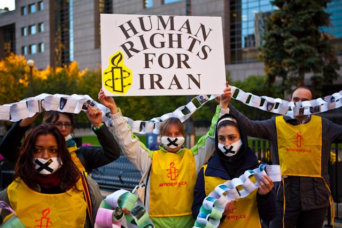- About
- Topics
- Picks
- Audio
- Story
- In-Depth
- Opinion
- News
- Donate
- Signup for our newsletterOur Editors' Best Picks.Send
Read, Debate: Engage.
| topic: | Human Rights |
|---|---|
| located: | Iran |
| editor: | Shadi Khan Saif |
The Iranian regime loses any legitimate argument over its assertion of sovereignty in domestic affairs when it resorts to the use of crude force against its own people to silence dissent.
Grim social media videos combined with eyewitness testimonies from people on the ground and information gathered from human rights activists reveal a harrowing pattern of unlawful killings by Iranian security forces, which have used excessive and lethal force to crush largely peaceful protests in more than 100 cities across Iran, which sparked by a hike in fuel prices.
As per Amnesty International, more than 100 protesters in 21 cities have been killed, but the Iranian state media have only reported a handful of protester deaths, as well as the deaths of at least four members of the security forces.
More often than not, any constructive criticism of the way the current far-right regime has handled this historic country – with deep-rooted traditions and culture – has been seen from the prison of perceived western conspiracy against the rulers.
Reminding those in the inner circles around the Iranian Supreme Leader of their due responsibility to serve, not rule, the ordinary people does not amount to naively denying the facts about hostile proxy and secret spy wars going on in the Greater Middle East. Nevertheless, it is this confusion deliberately peddled by those with wasted interests to legitimise their own foul-play. On one hand, we are witnessing a number of reputed rights groups, mostly western watchdogs of human rights, charging the Iranian regime of deadly oppression. On the other, pro-regime voices full of praises for the ruling elite. The moderate voices for reforms are clearly oppressed.
The shared values of humanity regardless of the ideological divide are enough to compel the Iranian authorities not to silence their people’s voice by imposing the curbs they have placed on the media. These values also grant the people a legitimate right to protest and call for change.
Image: Amnesty International, Canada
